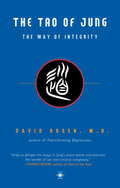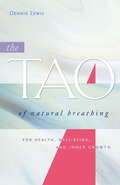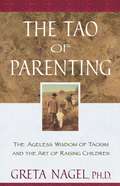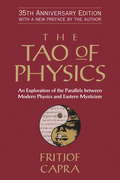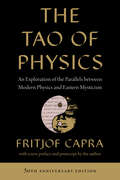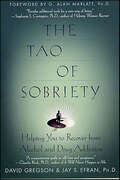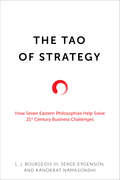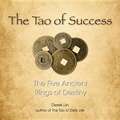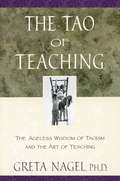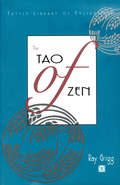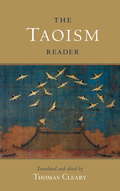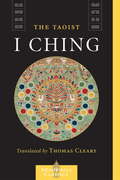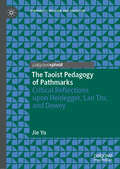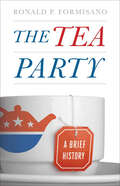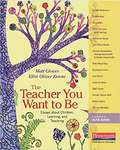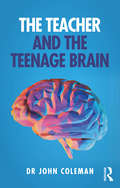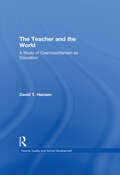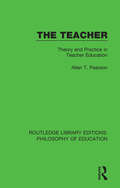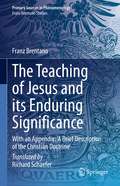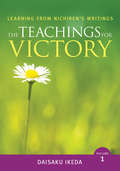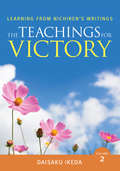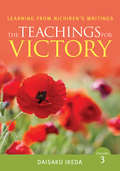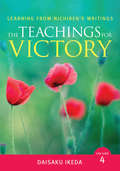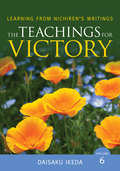- Table View
- List View
The Tao of Jung: The Way of Integrity
by David H. RosenThis startling new interpretation of Jung's life and psychology is based on the insight that he was essentially a Taoist. Drawing on Jung's own letters, aphorisms, and other writings, David Rosen examines six crises in Jung's personal development, from childhood revelations and youthful rebellions to his break with Freud and his later work with the I Ching. Rosen discovers many parallels between Jung's natural world of the psyche and that of Taoist philosophy: the integration of opposites; the Great Mother as the origin of all things; the I Ching and synchronicity; the Way of Integrity and individuation; and the need to release the ego and surrender to the Self or Tao.As an increasing number of people turn to Eastern philosophy as a means of handling the many stresses of an increasingly confounding world, this illuminating introduction to both Taoism and Jungian thought provides a valuable spiritual resource for contemporary followers of the Path.
The Tao of Natural Breathing: For Health, Well-Being, and Inner Growth
by Dennis LewisTake a life-affirming journey with Dennis Lewis into the physiological, psychological, and spiritual experience of breathing. A long-time student of Advaita Vedanta, Taoism, and the Gurdjieff Work, he presents a comprehensive approach to understanding the mechanics of the breath, as well as the relationship of breath, emotions, and energy. Best of all, he offers guided explorations of the Whole-Body Breath, the Spacious Breath, the Smiling Breath, the Vital Breath, and more. These practices will improve your health, increase your energy, and support your quest for inner growth.
The Tao of Parenting: The Ageless Wisdom of Taoism and the Art of Raising Children
by Greta K. NagelApplying the ancient yet timeless 81 principles of Taoism to parenting, The Tao Of Parenting features instructive anecdotes from four families to demonstrate how Taoist teachings help parents raise good, healthy children. The stories are just as diverse as the families who tell them (a blended family featuring children from separate marriages, a couple with different cultural and ethical backgrounds, a single parent of twin boys, and a couple with different parenting techniques learning to compromise).Some of the Taoist principles used by these families include:*Do Not Think of Self. Shows the rewards parents receive by making their children their number one priority.*The material is fleeting, the spiritual is everlasting. Demonstrates the rewards of caring for those in need.*Do Not Be Authoritarian. Shows how to foster self-reliance and responsibility in children while supporting their efforts, rather than controlling their every move.*Follow the middle road; it is the heart of knowing. Offers the benefits of parents being neither too permissive or too strict, but rather adjusting the rules for each child and each circumstance.There are many more valuable lessons in this special book which can be used by parents of all faiths to help guide their lives and those of their children.
The Tao of Physics: An Exploration of the Parallels between Modern Physics and Eastern Mysticism
by Fritjof CapraHere is the book that brought the mystical implications of subatomic physics to popular consciousness for the very first time--way back in 1975. Many books have been written in the ensuing years about the connections between quantum theory and the ideas of Buddhism, Hinduism, and Taoism, but Fritjof Capra's Tao of Physics serves as the foundation on which the others have been built, and its wisdom has stood the test of time. Its publication in more than twenty-three languages stands as testimony to its universal applicability, and its astonishing three and a half decades of strong sales to its enduring significance. This special edition celebrates the thirty-fifth anniversary of this early Shambhala best seller that has gone on to become a true classic. It includes a fresh cover design and a new preface by the author reflecting on further discoveries and developments in the years since the book's original publication."Physicists do not need mysticism," Dr. Capra says, "and mystics do not need physics, but humanity needs both." It's a message of timeless importance.
The Tao of Physics: An Exploration of the Parallels between Modern Physics and Eastern Mysticism
by Fritjof CapraAfter a quarter of a century in print, Capra's groundbreaking work still challenges and inspires. This updated edition of The Tao of Physics includes a new preface and afterword in which the author reviews the developments of the twenty-five years since the book's first publication, discusses criticisms the book has received, and examines future possibilities for a new scientific world.
The Tao of Sobriety: Helping You to Recover from Alcohol and Drug Addiction
by David Gregson Jay S. EfranThe Tao of Sobriety shows how to apply eastern philosophy to enhance recovery from addiction to alcohol and other drugs. With a few simple mental exercises, readers can learn how to quiet "The Committee," those nasty mental voices that undermine serenity and self-esteem. With leaders of the recovery movement enthusiastically endorsing this uniquely helpful book, The Tao of Sobriety is an invaluable addition to the recovery bookshelf.
The Tao of Strategy: How Seven Eastern Philosophies Help Solve Twenty-First-Century Business Challenges
by L. J. Bourgeois III Serge Eygenson Kanokrat NamasondhiThe Tao of Strategy combines ancient wisdom from the Eastern world’s great philosophers and lessons from modern-day business leaders to provide readers innovative approaches to unlock strategic breakthroughs for themselves and their organizations. Today’s organizational strategists—including executives, managers, consultants, and the business students who aspire to join their ranks—will encounter novel ways of solving complex problems. In this engaging examination of the wisdom of Confucius and the strategies of The Art of War, the mindfulness of the Buddha and the perspectives of the Bhagavad Gita, as well as the advice of The Tao Te Ching and the fun of playing the ancient board game of Go, The Tao of Strategy presents alternative, creative ways to open up one’s strategic thinking. The Tao of Strategy highlights a range of companies, from earth-moving equipment manufacturers Komatsu and Caterpillar to technology providers Infosys and Sun Microsystems to financial institutions Bank of America and Goldman Sachs. Interviews with chief executives from China Steel, PTT Group, Bacardi, Rodale Press, Aston Martin, and other organizations reveal how insights from Eastern philosophy inform the strategic decision-making of organizations and leaders around the world. By engaging with Eastern philosophy from the perspective of organizational strategy, The Tao of Strategy offers a novel approach to strategic thinking that can help readers navigate today’s increasingly complex strategic challenges and unpredictable global environment.
The Tao of Success
by Derek LinA modern book of destiny and power, using the ancient principles of the Tao Te Ching. How do we begin to discover and live our destined life? How can we use the ancient, Eastern philosophy to experience more success in our lives? From Derek Lin, Taoist master and author of The Tao of Daily Life, comes this practical, systematic approach to the ancient and time-honored spiritual learning process. The Tao of Success navigates the five rings of life, which are common patterns of traditional Tao cultivation, conceptualized by the ancient sages: your spirit, your mind, your relationships, your world, and your destiny. Success is achieved by discovering and experiencing these five concentric rings, from the inside out, and not in the future but in the here and now. Using the same format that made The Tao of Daily Life a breakout Eastern wisdom bestseller, Lin draws on the power of Taoist stories to illustrate important keys, or lessons. He then offers commentary on understanding and applying that story in modern life-all aimed to help readers live out the destiny that lies within themselves. By integrating the life-altering lessons of this book into their busy lives, readers can begin to cultivate the Tao. In The Tao of Success, Lin returns with his enlightening approach to understanding, centered on story and illumination of ancient Taoist secrets for the modern beginner and the familiar student alike. .
The Tao of Teaching: The Ageless Wisdom of Taoism and the Art of Teaching
by Greta K. NagelThe Tao of Teaching is for teachers, parents, and any others who are looking for a book of wisdom on how to deal with people, especially children, in a learning environment. The Tao of Teaching is written in the same style as the Tao Te Ching, and gives examples from the classrooms of three present-day teachers whom the author feels embody Taoist wisdom and "student-centered" educational methods. The Tao of Teaching is a labor of love, containing many important insights by a talented and respected professional whose emphasis is on the students' contribution in a learning environment, whatever the context.
The Tao of Zen
by Ray Grigg William GaetzThe premise of The Tao of Zen is that Zen is really Taoism in the disguise of Buddhism-an assumption being made by more and more Zen scholars. This is the first Zen book that links the long-noted philosophical similarities of Taoism and Zen. The author traces the evolution of Ch'an The The Tao of Zen is a fascinating book that will be read and discussed by anyone interested in both Taoism and Zen
The Taoism Reader
by Thomas ClearyFrom the time of its earliest sages in prehistoric China, Taoism has looked to the underlying Way of all things (the Tao) as a guide to thoughts and actions. For the Taoists, the patterns of nature revealed the answers to their deepest spiritual questions and provided the inspiration for their unique teachings. Over the centuries, Taoism has blossomed into a profound tradition with a variety of forms--all united by a single, core philosophy of radical simplicity and natural living. Today, Taoism is most widely known through the Tao-te Ching, yet its corpus of literature is vast--ranging from philosophical dialogues and essays to astonishing fables, legends, proverbs, and more. This compact collection of Taoism's greatest masterpieces introduces its most fundamental teachings and reveals the essential spirit of Tao. The Taoism Reader includes: * Tao-te Ching: the foundational source of Taoist thought by the legendary Lao Tzu * Chuang-tzu: philosophical dialogues from one of Taoism's most famous sages * Huai-nan-tzu: teachings from the time of the Han dynasty on affairs of state, natural science, and Taoist psychology * Wen-tzu: records of further sayings by Lao Tzu on the art of living * Tales of Inner Meaning: fables, stories, and jokes from the Lieh-tzu and others on the subtleties of Taoist philosophy * Sayings of Ancestor Lü: teachings from Lü Yen, a seminal figure in the founding of the Complete Reality school of Taoism and master synthesizer of China's classic spiritual traditions
The Taoist I Ching (Shambhala Classics Ser.)
by Thomas Cleary Lui I-MingThe I Ching , or "Book of Change," is considered the oldest of the Chinese classics and has throughout history commanded unsurpassed prestige and popularity. Containing several layers of text and given numerous levels of interpretation, it has captured continuous attention for well over two thousand years. It has been considered a book of fundamental principles by philosophers, politicians, mystics, alchemists, yogins, diviners, sorcerers, and more recently by scientists and mathematicians. This first part of the present volume is the text of the I Ching proper--the sixty-four hexagrams plus sayings on the hexagrams and their lines--with the commentary composed by Liu I-ming, a Taoist adept, in 1796. The second part is Liu I-ming's commentary on the two sections added to the I Ching by earlier commentators, believed to be members of the original Confucian school; these two sections are known as the Overall Images and the Mixed Hexagrams. In total, the book illuminates the Taoist inner teachings as practiced in the School of Complete Reality. Well versed in Buddhism and Confucianism as well as Taoism, Liu I-ming intended his work to be read as a guide to comprehensive self-realization while living an ordinary life in the world. In his attempt to lift the veil of mystery from the esoteric language of the I Ching , he employs the terminology of psychology, sociology, history, myth, and religion. This commentary on the I Ching stands as a major contribution to the elucidation of Chinese spiritual genius.
The Taoist Pedagogy of Pathmarks: Critical Reflections Upon Heidegger, Lao Tzu, And Dewey (Spirituality, Religion, and Education)
by Jie YuBased on the intertwined complex conversations among Heidegger, Dewey, and Lao Tzu, this book explores the possibilities of the Taoist Pedagogy of Pathmarks as a clearing between truth and untruth, responding to the spiritual call of Tao as inaction and teaching as releasement. In this book, Yu provides a critical exploration of the rich dynamics in the “direct” conversations among the three great thinkers of east and west, highlighting the implications of their ideas for education throughout. As more educational researchers, teacher educators, and teachers recognize the limitations of didactic teaching-as-telling, the author brings an alternate pathway to light.
The Taoist Soul Body: Harnessing the Power of Kan and Li
by Mantak ChiaA guide to the practice of the Lesser Kan and Li that gives birth to the soul body and the immortal spirit body • Shows how to awaken higher consciousness through practices in total darkness that stimulate the release of DMT by the pineal gland • Shows how to transform sexual energy into life-force energy to feed the soul body The Lesser Enlightenment of Kan and Li practice combines the compassion of the heart energies (yang/fire) with sexual energies originating in the kidneys (yin/water) to form and feed the soul or energy body. Practice of the Chinese formula Siaow Kan Li (yin and yang mixed) uses darkness technology to literally “steam” the sexual energy (jing) into life-force energy (chi) by re-versing the location of yin and yang power. This inversion places the heat of the bodily fire from the heart center beneath the coolness of the bodily water of the sexual energy of the perineum, thereby activating the liberation of transformed sexual energy.Darkness technology has been a key element of Taoist practice--and of all Inner Alchemy traditions--throughout the ages. A total darkness environment stimulates the pineal gland to release DMT into the brain. The darkness actualizes successively higher states of consciousness, correlating with the accumulation of psychedelic chemicals in the brain. In the darkness, mind and soul begin to wander freely in the vast realms of psychic and spiritual experience. Death is no longer to be feared because life beyond the physical body is known through direct experience.The birth of the soul is not a metaphor. It is an actual process of converting energy into a subtle body. Developing the soul body is the preparation for the growth of the immortal spirit body in the practice of the Greater Enlightenment of Kan and Li.
The Tea Party: A Brief History
by Ronald P. FormisanoA historian looks at the remarkable rise of the Tea Party movement and its effect on American politics.The Tea Party burst on the national political scene in 2009–2010, powered by right-wing grassroots passion and Astroturf big money. Its effect is undeniable, but the message, aims, and staying power of the loosely organized groups seem unclear. In this book, American political historian Ronald P. Formisano probes the rise of the Tea Party movement during a time of economic crisis and cultural change and examines its impact on American politics.A confederation of intersecting and overlapping organizations, with a strong connection to the Christian fundamentalist Right, the phenomenon could easily be called the Tea Parties. The American media’s fascination with the Tea Party?and the tendency of political leaders embracing the movement to say and do outlandish things?not only helped the movement, but also has diverted attention from its roots, agenda, and the influence it holds over the Republican Party and the American political agenda. Looking at the Tea Party’s claims to historical precedent and patriotic values, Formisano locates its anti-state and libertarian impulses deep in American political culture as well as in recent voter frustrations. He sorts through the goals the movement’s different factions espouse and shows that, ultimately, the contradictions of Tea Party libertarianism reflect those ingrained in the broad mass of the electorate.Throughout American history, movements have emerged to demand reforms or radical change, only to eventually fade away, even if parts of their programs often are later adopted. Whether the Tea Party endures remains to be seen, but Formisano’s brief history certainly offers clues.
The Teacher You Want to Be: Essays about Children, Learning, and Teaching
by Alfie Kohn Ellin Oliver Keene Matt GloverThis book is about bringing the education we want for our own children to all. It is focused on a set of strongly held beliefs that drive the actions of educators every day. Each chapter of the book is focused on a single belief and invites readers to consider what they can do to help children attend schools based on the true, authentic expressions of their teachers' beliefs. Contributions include essays by many prominent educators including Sir Ken Robinson, Deborah Meier and Thomas Newkirk. Please click on the contents tab below for a list of all 18 contributors.
The Teacher and the Teenage Brain
by John ColemanThe Teacher and the Teenage Brain is essential reading for all teachers and students of education. This book offers a fascinating introduction to teenage brain development and shows how this knowledge has changed the way we understand young people. It provides a critical insight into strategies for improving relationships in the classroom and helping both adults and teenagers cope better with this stage of life. Dr John Coleman shows how teachers and students can contribute to healthy brain development. The book includes information about memory and learning, as well as guidance on motivation and the management of stress. Underpinned by his extensive work with schools, Dr Coleman offers advice on key topics including the importance of sleep, the social brain, moodiness, risk and risk-taking and the role of hormones. This book is extensively illustrated with examples from classrooms and interviews with teachers. It explicitly links research and practice to create a comprehensive, accessible guide to new knowledge about teenage brain development and its importance for education. Accompanied by a website providing resources for running workshops with teachers and parents, as well as an outline of a lesson plan for students, The Teacher and the Teenage Brain offers an innovative approach to the understanding of the teenage brain. This book represents an important contribution to teacher training and to the enhancement of learning in the classroom.
The Teacher and the World: A Study of Cosmopolitanism as Education (Teacher Quality and School Development)
by David T. HansenWinner of the 2013 American Educational Studies Association's 2013 Critics Choice Award! Teachers the world over are seeking creative ways to respond to the problems and possibilities generated by globalization. Many of them work with children and youth from increasingly varied backgrounds, with diverse needs and capabilities. Others work with homogeneous populations and yet are aware that their students will encounter many cultural changes in their lifetimes. All struggle with the contemporary conditions of teaching: endless top-down measures to manipulate what they do, rapid economic turns and inequality in supportive resources that affect their lives and those of their students, a torrent of media stimuli that distract educational focus, and growth as well as shifts in population. In The Teacher and the World, David T. Hansen provides teachers with a way to reconstruct their philosophies of education in light of these conditions. He describes an orientation toward education that can help them to address both the challenges and opportunities thrown their way by a globalized world. Hansen builds his approach around cosmopolitanism, an ancient idea with an ever-present and ever-beautiful meaning for educators. The idea pivots around educating for what the author calls reflective openness to new people and new ideas, and reflective loyalty toward local values, interests, and commitments. The book shows how this orientation applies to teachers at all levels of the system, from primary through university. Hansen deploys many examples to illustrate how its core value, a balance of reflective openness to the new and reflective loyalty to the known, can be cultivated while teaching different subjects in different kinds of settings. The author draws widely on the work of educators, scholars in the humanities and social sciences, novelists, artists, travellers and others from both the present and past, as well as from around the world. These diverse figures illuminate the promise in a cosmopolitan outlook on education in our time. In this pioneering book, Hansen has provided teachers, heads of school, teacher educators, researchers, and policy-makers a generative way to respond creatively to the pressure and the promise of a globalizing world.
The Teacher: Theory and Practice in Teacher Education (Routledge Library Editions: Philosophy of Education #15)
by Allen T. PearsonIt is widely agreed that teacher education must consist of two general components. There is a knowledge component which contains specialized subject matter knowledge, and a practical component in which intending teachers develop skills and abilities. In this original and compelling work, first published in 1989, Pearson attempts to examine the connection between the two. This title will be of interest to students of education.
The Teaching of Jesus and its Enduring Significance: With an Appendix: 'A Brief Description of the Christian Doctrine' (Primary Sources in Phenomenology)
by Franz BrentanoHere, for the first time in English, is Franz Brentano’s The Teaching of Jesus, a compendium of texts Brentano assembled for publication shortly before his death that constitute a frank, public settling of accounts with the Christian religion. Originally conceived by Brentano as a volume that might help others similarly led to doubt the doctrines of Christianity, the book is remarkably free of bitterness or spitefulness. On the contrary, what makes the book of singular importance, especially now, is its careful attempt at taking stock of the positive and negative influence Christianity has had in history. This text appeals to those researchers and scholars interested in the work of Franz Brentano and his work on the philosophy of religion, in this case, Christianity.
The Teachings for Victory, Volume 1 (Learning from Nichiren's Writings)
by Daisaku IkedaWhat constitutes a meaningful life? What is true happiness? Nichiren Buddhism, based on the Lotus Sutra, is a teaching of hope that provides answers to these and other important questions for modern life. Ranked among the most important works in Mahayana Buddhism, Nichiren’s 13th century writings were revolutionary. They provide a practical formula for enabling everyone to achieve a victory in every aspect of their lives and attain an unshakable state of happiness.
The Teachings for Victory, Volume 2 (Learning from Nichiren's Writings)
by Daisaku IkedaNichiren Daishonin’s writings provide a practical formula for enabling all people to achieve victory in every aspect of their lives and attain an unshakable state of happiness. This volume of Learning from Nichiren’s Writings: The Teachings for Victory contains SGI President Daisaku Ikeda’s lectures on seven of Nichiren’s letters: "On Practicing the Buddha’s Teachings"; "The Proof of the Lotus Sutra"; "The Hero of the World"; "The Blessings of the Lotus Sutra"; "The Sutra of True Requital"; "King Rinda"; and "The Kalpa of Decrease."
The Teachings for Victory, Volume 3 (Learning from Nichiren's Writings)
by Daisaku IkedaNichiren Daishonin’s writings provide a practical formula for enabling all people to achieve victory in every aspect of their lives and attain an unshakable state of happiness. This volume of Learning from Nichiren’s Writings: The Teachings for Victory contains SGI President Daisaku Ikeda’s lectures on nine of Nichiren’s letters: “On the Offering of a Mud Pie” “A Father Takes Faith” “How Those Initially Aspiring to the Way Can Attain Buddhahood through the Lotus Sutra” “Letter to the Lay Priest Nakaoki” “Letter to Konichi-bo” “The Good Medicine for All Ills” “The Four Debts of Gratitude” “On the Treasure Tower” “Letter from Teradomari” President Ikeda elucidates the importance of studying Nichiren’s writings as the foundation of Nichiren Buddhism as practiced by the Soka Gakkai International. His lectures bring Nichiren’s immense wisdom, compassion, and courage into focus for the present age. In reading and studying these lectures, we learn how to apply in daily life Nichiren’s profound philosophy for inner transformation and victory for both ourselves and others. The Teachings for Victory will empower you to develop the strength and wisdom to bring forth your inherent potential.
The Teachings for Victory, Volume 4 (Learning from Nichiren's Writings)
by Daisaku IkedaNichiren Daishonin’s writings provide a practical formula for enabling all people to achieve victory in every aspect of their lives and attain an unshakable state of happiness. This volume of Learning from Nichiren’s Writings: The Teachings for Victory contains SGI President Daisaku Ikeda’s lectures on nine of Nichiren’s letters: “On the Real Aspect of the Gohonzon” “The Four Virtues and the Four Debts of Gratitude” “A Ship to Cross the Sea of Suffering” “Flowering and Bearing Grain” “General Stone Tiger” “Reply to Niiama” “The Workings of Brahma and Shakra” “Reply to Yasaburo” “The Three Obstacles and Four Devils” President Ikeda elucidates the importance of studying Nichiren’s writings as the foundation of Nichiren Buddhism as practiced by the Soka Gakkai International. His lectures bring Nichiren’s immense wisdom, compassion, and courage into focus for the present age. In reading and studying these lectures, we learn how to apply in daily life Nichiren’s profound philosophy for inner transformation and victory for both ourselves and others. The Teachings for Victory will empower you to develop the strength and wisdom to bring forth your inherent potential.
The Teachings for Victory, vol. 6: The Teachings For Victory, Vol. 6 (Learning from Nichiren's Writings)
by Daisaku IkedaNichiren Daishonin's writings provide a practical formula for enabling all people to achieve victory in every aspect of their lives and attain an unshakable state of happiness.This volume of Learning from Nichiren's Writings: The Teachings for Victory contains two commemorative lectures (November 18 and May 3) by SGI President Daisaku Ikeda in addition to lectures on seven of Nichiren's letters:"False Official Documents""The Eight Winds""The Wealthy Man Sudatta""New Year's Gosho""The Difficulty of Sustaining Faith""Letter to the Sage Nichimyo""The One-eyed Turtle and the Floating Log"President Ikeda elucidates the importance of studying Nichiren's writings as the foundation of Nichiren Buddhism as practiced by the Soka Gakkai International. His lectures bring Nichiren's immense wisdom, compassion, and courage into focus for the present age. In reading and studying these lectures, we learn how to apply in daily life Nichiren's profound philosophy for inner transformation and victory for both ourselves and others.The Teachings for Victory will empower you to develop the strength and wisdom to bring forth your inherent potential.
